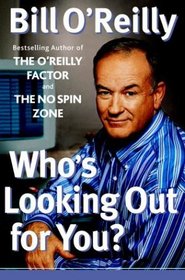Helpful Score: 2
I don't care what political background you are, anyone can find this book useful. What O'Reilly does is try and help us out by giving us tips on being successful in life. He points out who will most likely look out for us (ie: most friends and family) and who will not (i.e. the government, celebrities, CEOs). He describes his past, like how he got into his profession. He describes what he did wrong (i.e. being arrogant, trying to do everything for himself) and what he did right (i.e. worked very hard and did the best he could at his job).
Helpful Score: 1
A very interesting and informative read ...as an American citizen, voter, and taxpayer - who's really looking out for YOU ?? Not some of the people who you think should be ..read the book !
Helpful Score: 1
Who's Looking Out for You is both a summary of various times O'Reilly has taken on authority (on the left, in the middle, and on the right), including during times when the rest of the mainstream media missed the boat, as well as a book of advice on how not to make some of the same mistakes he has made in his career. It's nothing terribly groundbreaking, in terms of the advice, but it is a nice, concise group of considerations that can help a person quickly inventory their own life and possibly avoid some of the same pitfalls he and many other people make.
Some of the more critical parts of the book include:
-Some brief, but enlightening discussion about education and school vouchers
-How President Clinton, regarded as a champion of minorities, was actually one of the worst post-slavery presidents in that regard
-Discussion on his faith and also his problems with the Catholic Church
-Issues regarding the separation of church and state
O'Reilly does miss the boat when he talks about Pope John Paul II, specifically when talking about the Pope's view of the Iraq War. It was the Pope's viewpoint that the war was unjust. He, however, was not speaking infallibly when he made those statements. Catholics, like O'Reilly and myself, were free to disagree with him on that (and both of us did and still do). It is a matter of conscience, in this case, and a person who opposed the war on its merits before the war began has a respectable position, even if some of us don't agree. (The hind-sighters who first supported it and now oppose it do not have such a respectable position.)
All in all this is an enlightening read and well-worth your time. At a little over 200 pages and in a conversational tone, it is not a huge commitment.
Some of the more critical parts of the book include:
-Some brief, but enlightening discussion about education and school vouchers
-How President Clinton, regarded as a champion of minorities, was actually one of the worst post-slavery presidents in that regard
-Discussion on his faith and also his problems with the Catholic Church
-Issues regarding the separation of church and state
O'Reilly does miss the boat when he talks about Pope John Paul II, specifically when talking about the Pope's view of the Iraq War. It was the Pope's viewpoint that the war was unjust. He, however, was not speaking infallibly when he made those statements. Catholics, like O'Reilly and myself, were free to disagree with him on that (and both of us did and still do). It is a matter of conscience, in this case, and a person who opposed the war on its merits before the war began has a respectable position, even if some of us don't agree. (The hind-sighters who first supported it and now oppose it do not have such a respectable position.)
All in all this is an enlightening read and well-worth your time. At a little over 200 pages and in a conversational tone, it is not a huge commitment.





